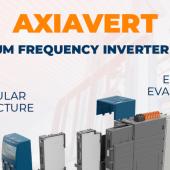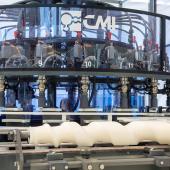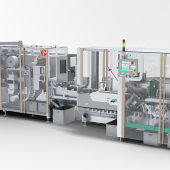Automation for food
The latest data on food processing and packaging machines industry, some cases of significant applications, the Mitsubishi Electric approach to factory automation, an original concept MES system... Suggestions from the "Alimentare l’innovazione" conference (Enhancing innovation in the food Industry).
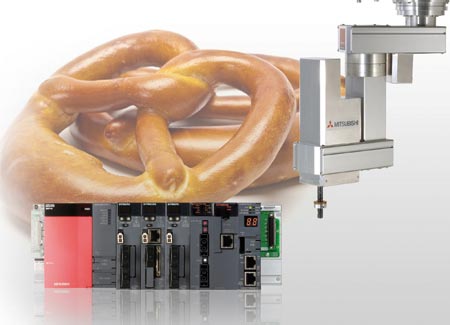 Held November 14th last year at Baggiovara, an outlying part of Modena, home to the beautiful Villa Marchetti and Ucima’s headquarters, the conference "Alimentare l’innovazione" - Traceability, Safety and Technology for growth in Food, organized by Mitsubishi Electric.
Held November 14th last year at Baggiovara, an outlying part of Modena, home to the beautiful Villa Marchetti and Ucima’s headquarters, the conference "Alimentare l’innovazione" - Traceability, Safety and Technology for growth in Food, organized by Mitsubishi Electric.
The objective of the big industrial automation player (with its Italian branch headquarters in Agrate Brianza, Milan) was to offer the industry an opportunity to glean the latest economic and technical information, helpful in competing in one of the strategic sectors of top Italian production.
Antiyclical by definition, according to the data and painstaking analysis provided during the encounter by Luigi Pelliccia of the Federalimentare Study Centre, the Italian food sector generates a turnover of 130 billion euro and employs 408,000 people.
To continue to grow in the current complex economic situation, the sector is relying increasingly on exports, as a result, activating processes of change necessary to grow in size, defend its competitiveness on the world market-and return to the profitability lost previously.
It is a process that demands the support of the right industrial policies, a new managerial approach and the development of a suitable technical knowhow throughout the sector, that for its part shows encouraging results.
The responses of suppliers and the University
The responsiveness of automation and automatic machine suppliers was demonstrated by the talks held at the conference, opened by the welcome address made by Rafael Bencomo, Factory Automation Division Manager of the Italian subsidiary of Mitsubishi Electric, and Luciano Sottile, past vice president of Ucima. Their talks documented, data in hand, the strengths and the trends of the sector represented (Italy, as is known, is the second largest producer of packaging and wrapping machines after Germany, with a share of 26.4% and a turnover of 4.3 billion euro - Source Centro Studi Ucima).
But, aboveall, eloquent testimonials were given by speakers who told stories of recent applications, able to document the contribution of packaging, marking and Mitsubishi Electric’s solutions to the development of well-designed and well-conducted automated processes. The spokesman for Kraft Food (Donauwörth branch), Logicon, Balluff Automation and the Order of Food Technologists illustrated different aspects of the food industry (efficiency and maintenance of systems, automated factories, the primary, secondary and transport packaging, the use of RFID and robots) and the solutions fielded to operate with efficiency and the necessary competitivity. A theoretical and technical contribution was also provided by exponents from the universities that, along with the Order of Food Technologists, sponsored the encounter: the University of Parma, in the words of Professor Massini, updated on "Automatic control of critical parameters in the thermal treatment in continuous aseptic flow" and the Carlo Cattaneo University (LIUC) Castellanza, represented by Professor Toscano, illustrated the concept of open innovation, informing on programs in the Master in Food Management and giving news of the work group newly set up by some leading food sector concerns (Whirlpool, Autogrill, Goglio, Illy, Peroni…) to share information, ideas, projects.
Vision and automation
As Rafael Bencomo stated at the opening of the conference «over the last two years Mitsubishi Electric Factory Automation has grown in Italy beyond the average for its sector - thanks to the quality of products and the company’s ability to formulate proposals that meet the needs of the markets. In this process of development, the growth of food & beverage is of strategic importance to us and is an outlet sector has not yet fully been explored, together with the complementary area of packaging and wrapping machines as well as the "meta-area" for works activity data flow management».
The market approach of the Japanese group takes into account the requirements of efficiency, safety and economy common throughout the industry, as well as issues specific to individual market sectors.
«Food & beverage - Marco Clerici, Key Account Manager, Mitsubishi Electric Factory Automation Italian subsidiary sums up - must deal with increasing pressure of costs (energy in particular) and regulations, with the increasing variety of products and packaging with ever shorter lifecycles and with the consequent fragmentation of the lots, with the diversity of the markets served, with ever speedier technological progress.
All this is being addressed by automating individual processes and making use of MES (Manufacturing Execution Systems) for production management and integration with other company systems».
It is an advanced solution that, on the one hand, excessively increases the flow of data to be managed, but on the other hand, if handled properly, can generate significant benefits, namely: real-time visibility of the processes, reducing cycle times and imputation data, reduction of work in progress, paper documents, lead time, faults ... as well as positive effects of financial order, and more».
Clerici claims the original contribution that Mitsubishi Electric has to offer in the field of advanced systems, describing the steps of analysis and design that have led group experts to design the "ideal MES": «Starting from the needs and existing solutions and adopting new viewpoints we ended up with some hitherto unseen results.
Our hardware allows us to manage all aspects of data production and management in an integrated and simple manner, overcoming the typical problems of traditional MES. How? Our systems are inherently immune to cyber attacks and can be integrated into any application that leverages commercial databases and scalable data traffic and high speed transfer requests; MES architecture can be integrated into service-oriented type architecture and adjusts flexibly to meet the needs of both small, medium-sized and large concerns».
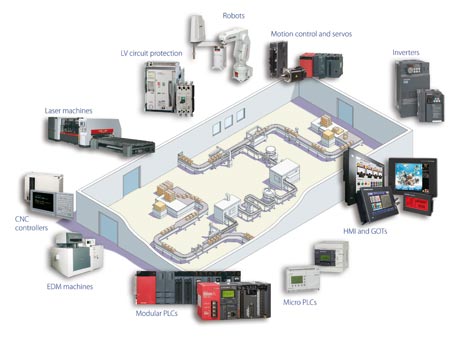 Mitsubishi Electric for the factory Mitsubishi Electric for the factoryMitsubishi Electric is a world leader in the manufacture of electrical and electronic devices for IT and telecommunications, space research and satellite communications, consumer electronics, industrial, energy, transportation and construction applications. The group ranks 203rd in the Fortune rating and holds thirteenth position of WIPO Top PCT Applications (726 patents published in 2011): Mitsubishi has been in Europe since 1969, with operations in 13 countries, and since 1985 in Italy where it operates through five business divisions (Air Conditioning, Factory Automation & Mechatronics, Semiconductors, Visual Information e Automotive). In the general economy of the group industrial automation stands as the second sector of activity in terms of business volumes, with a share of 23.4%, immediately after Energy. The Factory Automation division designs, manufactures and distributes high level (MES, MAPS, C-Controller, Batch Control) control and visualization as well as motion control, electro-mechanical and mechatronic solutions, positioning the Japanese company as third world supplier. Mitsubishi Electric is committed to the development of eco-friendly products and activities and programs in the promotion of Corporate Social Responsibility programs which include, among other things, based on 1991 figures, a 30% reduction in CO2 emissions by 2021, that are to reach 50% by 2050. |











